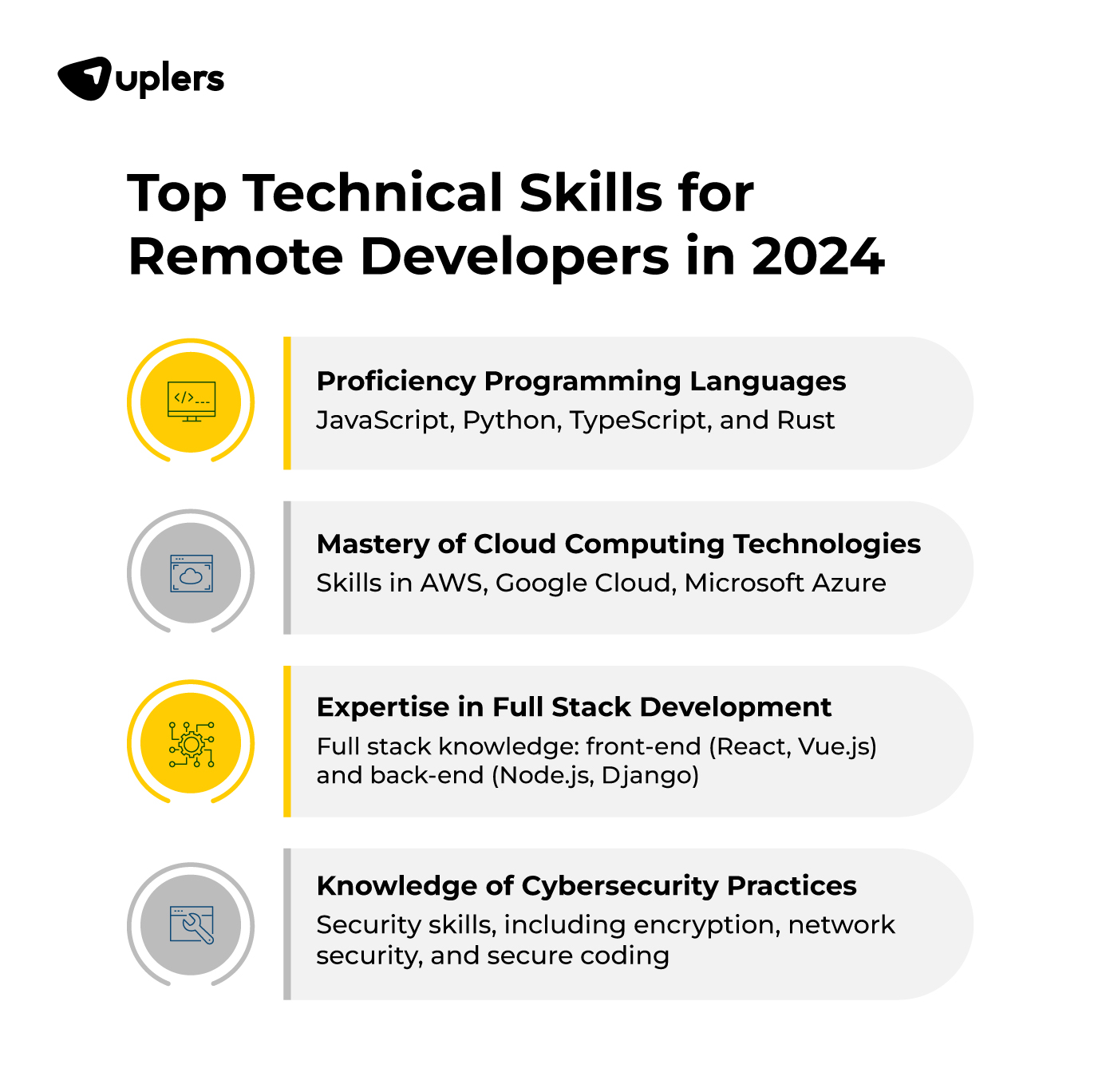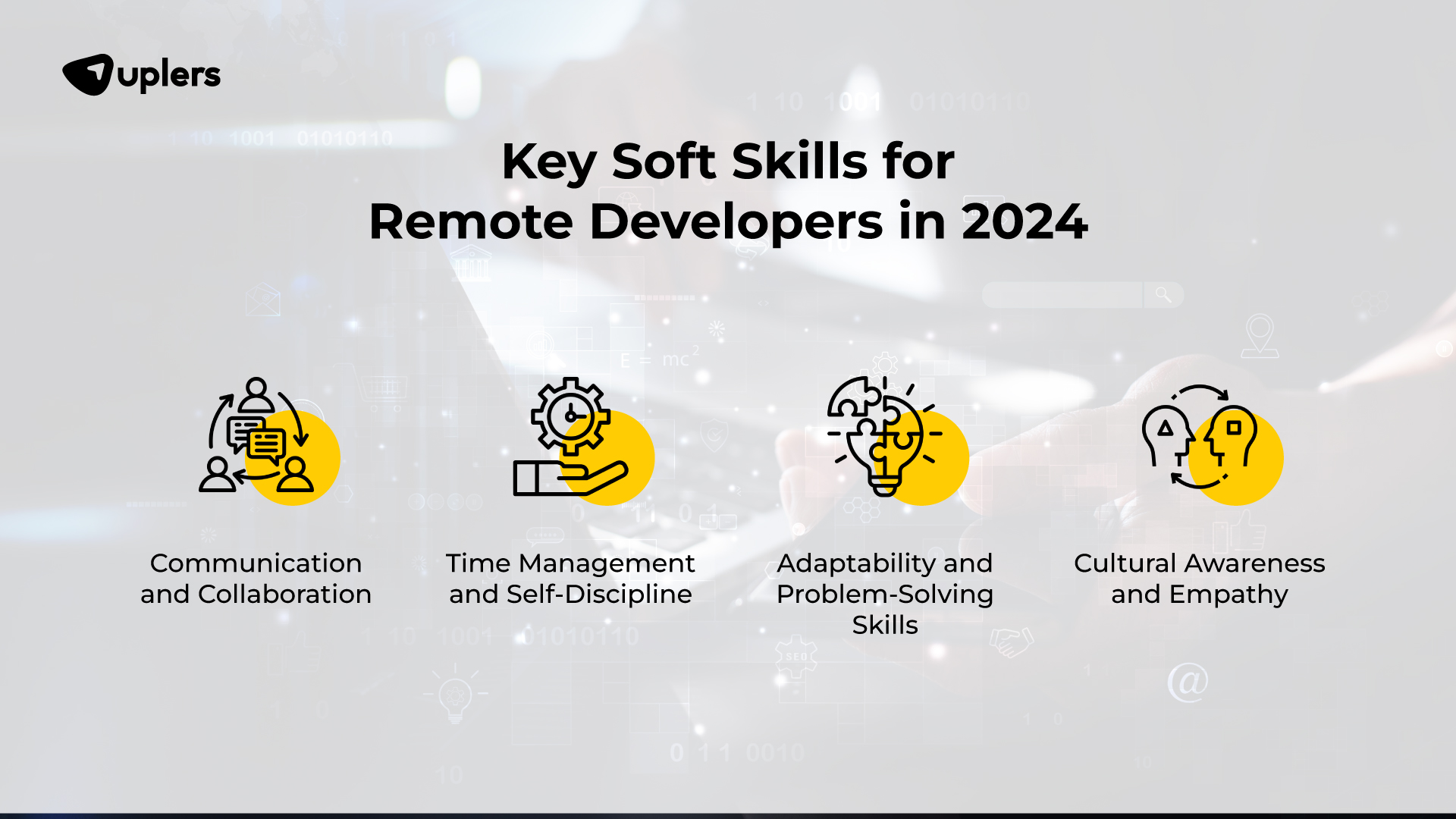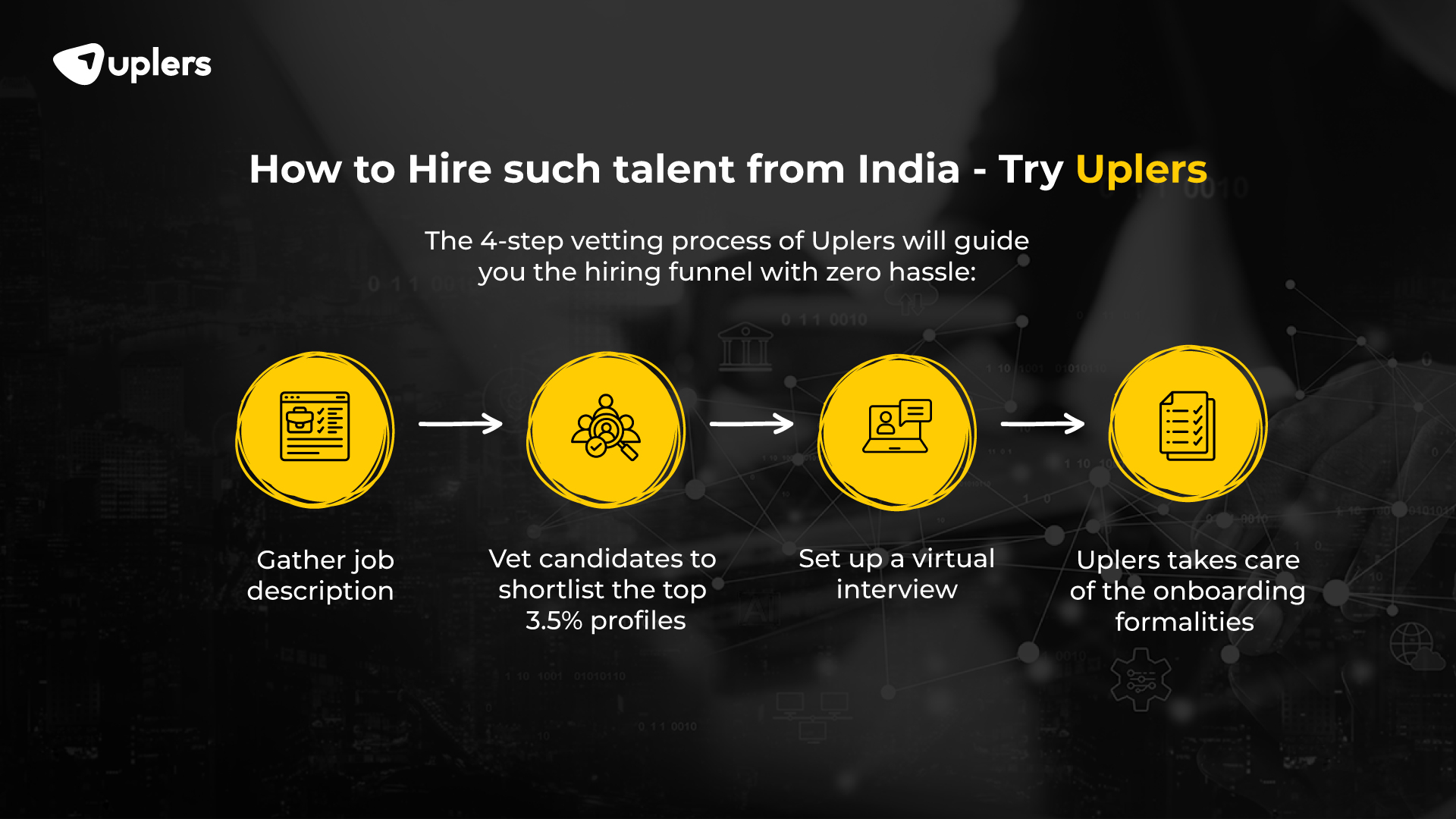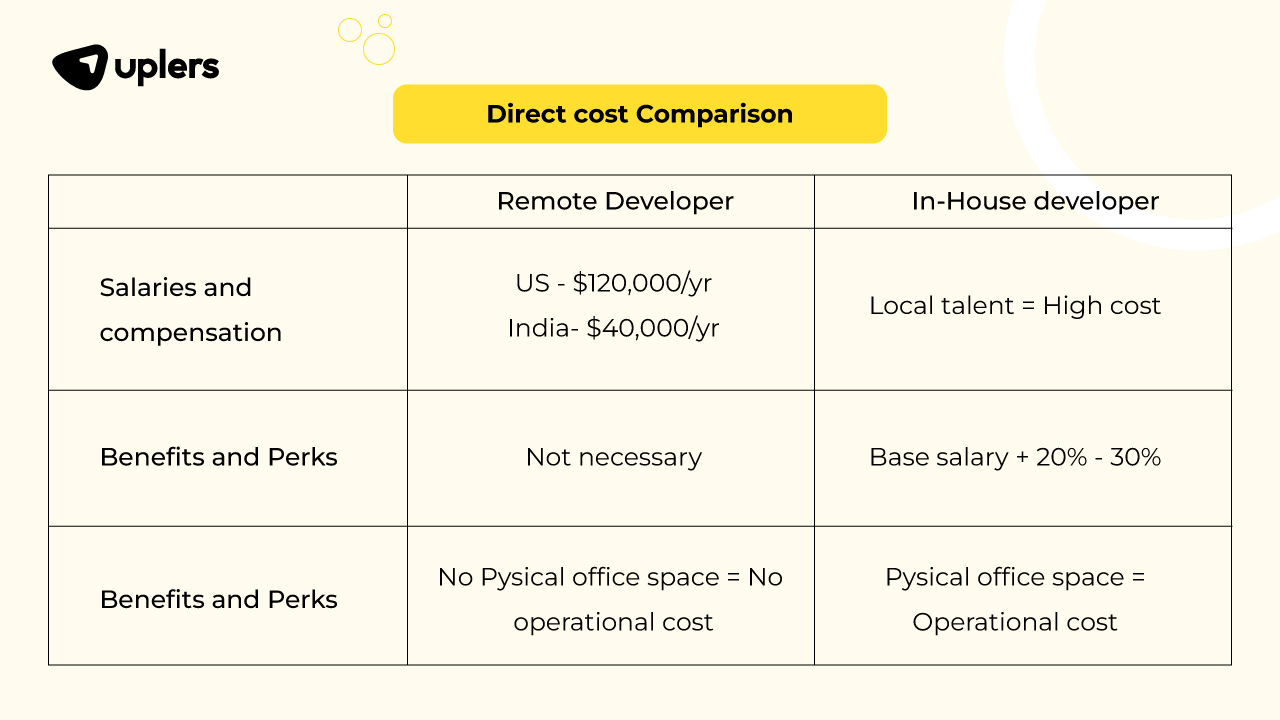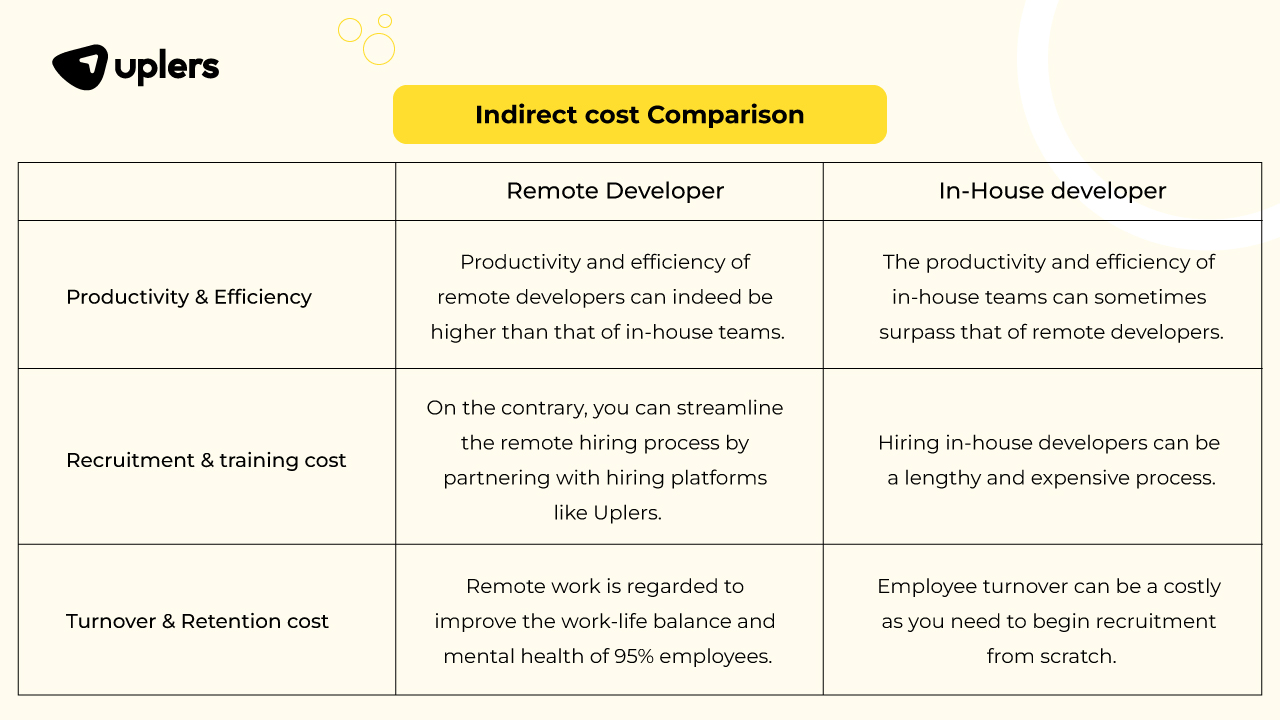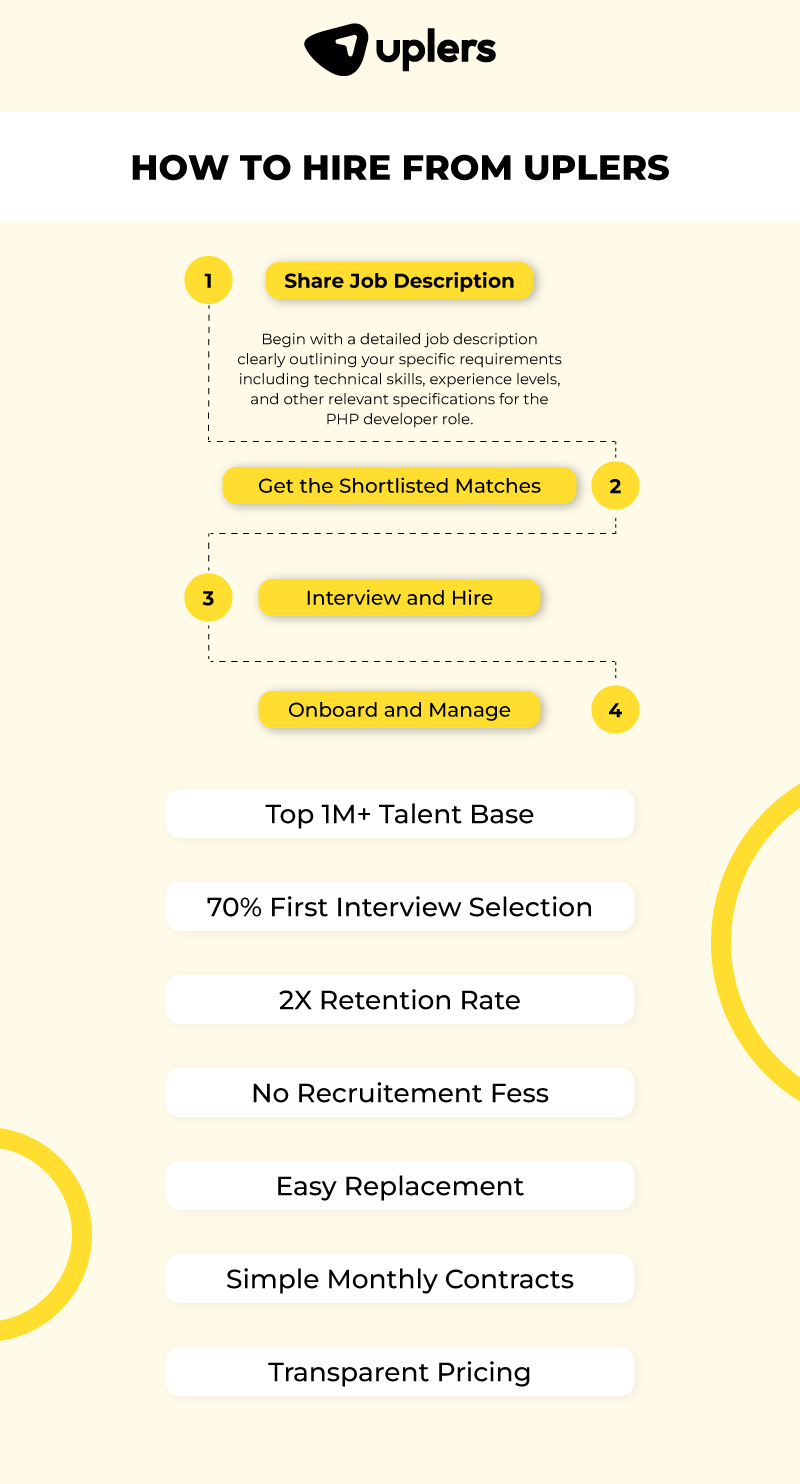Remote hiring has ignited a firestorm in the recruitment landscape for startups, SaaS businesses, and large-scale enterprises alike. Imagine the days when you were restricted to a local talent pool to fill the vacant spots in your team. Wasn’t it a hustle to skim through the applications and yet not be satisfied with what you have? Didn’t you have to settle for less while paying more due to the talent scarcity and rising skills gap?
All this has now become things of the past as the market has evolved and created room for remote hiring. Hiring managers of startups and SaaS businesses have embraced the transition to a global talent network. Remote hiring is set to be a game-changer and is here to stay with SaaS companies being at the forefront of this shift.
With the rise of distributed teams remote hiring is a mutually beneficial strategy for SaaS companies as well as the talent. As a SaaS business you gain access to a global talent network cost-effectively while experiencing increased productivity and flexibility. Simultaneously for the remote talent they have the flexibility to work from home while maintaining a healthy-work life balance.
With these advantages and several more there is no doubt in the rising prominence of this hiring approach globally. However, before diving in you need to understand the nuances of this alternative. You must be aware about the costs, the skills needed, ROI involved, how to hire remote developers and manage them effectively, and much more.
In this blog let’s resolve these concerns with actionable insights to help you make informed decisions with everything you need to know to build a high-performing remote team.
Cost of Hiring Remote Developers
Let’s start by addressing the elephant in the room; the weight of remote hiring on your pocket. Yes, remote hiring is definitely light on your budget compared to on-site hiring. By switching to remote hiring or outsourcing you can witness a saving of at least $10,000 – $11,000 per employee in the office costs alone.
To help you understand this better, we will look at the cost bifurcation.
Cost Breakdown: Monthly vs. Yearly vs. Project-Based Rates
The cost of hiring a dedicated remote development team can vary significantly based on the engagement model. Let’s walk through a quick comparison:
Engagement Model | Average Cost (In USD) | Best-suited for |
| Monthly Hiring | $2000 – $5000 | Long-term projects |
Yearly Hiring | $50,000 – $150,000 | Ongoing development needs |
| Project-based rates | $70 – $150 per hour | Short-term or time-bound projects |
Remote Developer Salaries by Region – USA Vs. India
You might have heard from your fellow colleagues in the hiring industry or read on the web that hiring from India can be cost-effective. You can get high-quality talent but at a competitive rate due to the vast availability of skilled talent and low living costs.
In the above section we have already discussed the average costing of hiring remote developers in the USA. It’s time to look at the remote developer salary trends in India.
Engagement Model | Average Cost in India |
Monthly Hiring | $2000 – $3500 |
| Yearly Hiring | $24,000 – $42,000 |
Surprised to look at the substantial disparity in the cost of hiring remotely from the USA and India? Now you see why India has emerged as a globally preferred player in the remote hiring industry, especially for SaaS businesses.
Hidden Costs: Tools, Training, and Onboarding
Just like on-site hiring has its own set of restrictions like limited talent availability, lack of flexibility and scalability, and many more; remote hiring also has its downsides. While it is majorly a cost-effective approach, there are hidden expenses associated with it such as:
- Tools – Collaboration platforms like Slack, Zoom, and project management tools like Trello, Asana add to the hiring cost.
- Training – You might have to upskill the developers to align with your tech stack.
- Onboarding – Integrating new hires into your workflow that too virtually can demand significant time and resources.
Reality check: Nothing in life comes served on a golden platter, you need to be prepared to face the odds!
Likewise, there are a few cons of hiring remotely, but the benefits outweigh them in the long-run.
Essential Skills to Look for in Remote Developers

After cost, the next puzzle in the mystery of how to hire remote developers is skills evaluation. Don’t make the mistake of being blindsided by the qualifications and experiences beautified on a resume. Verify them in real-time by conducting a rigorous skills assessment.
For this you must evaluate the technical skills as well as soft skills of the remote developers. Since they will be operating in a virtual work setup without direct supervision, skills evaluation becomes an indispensable aspect of the hiring funnel. What are the most in-demand remote developers skills?
Technical Skills to Evaluate:
- Frontend – Must have proficiency in front-end languages and frameworks such as HTML, CSS, JavaScript, React, Angular, and likewise.
- Backend – Expertise in back-end frameworks and languages such as Node.js, Python, Ruby on Rails, PHP, etc. is vital.
- Full stack – Developers skilled in front-end as well as back-end development can be a treasure trove.
- AI – Artificial intelligence is gaining rapid prominence across every industry, including SaaS businesses. Considering this, remote developers must have knowledge of machine learning algorithms, NLP, and emerging technologies.
Soft Skills to Evaluate:
To operate in a remote work setting with optimal productivity and efficiency, the following soft skills are needed to complement technical proficiency:
- Communication – Clear and concise communication to translate ideas into real-world application. It’s a prerequisite to bridge the distance barrier.
- Collaboration – Due to time zone difference and the absence of face-to-face interactions, the ability to work seamlessly across distributed teams is a must.
- Problem-solving – A proactive approach and a problem-solving mindset to overcome challenges independently is required.
- Adaptability – In the digital age driven by technological advancements an adaptable mindset has become mandatory. Remote developers must be willing to adapt to new trends in the industry and evolving industry norms. They should also be adaptable to shifts in the remote working patterns.
How to Assess a Remote Developer’s Skills Before Hiring
There are several ways that you can leverage to assess remote developers skills before hiring them. Some of the proven practices include:
- Conducting real-time coding challenges and technical assessments.
- Evaluating past projects and work portfolio.
- Using behavioral interviews to gauge soft skills.
Where to Find the Best Remote Developers
The next step in the hiring journey is to identify the best platforms to source and hire candidates. Just being ready to hire remotely doesn’t suffice, you must be well-versed with how to hire remote developers from different countries.
Besides the traditional practices of hiring from online job boards and sites, hiring platforms have now become the smarter way of hiring. Let’s look at the top hiring platforms that have made it to the preferred list of SaaS businesses globally:
Uplers
Uplers serves as an end-to-end AI-driven hiring platform that specializes in connecting businesses with top product and engineering talent from India. With the largest network of over 1.5 million professionals we use artificial intelligence with human evaluation to give you the top 3.5% remote profiles.
At Uplers we implement a 4-step vetting process to ensure that only the best profiles make it to your inbox within 48 hours. SaaS companies seeking efficient and high-quality hires choose our platform for the following unique offerings:
- Hassle-free remote recruitment
- Over a decade of experience serving 7,000+ renowned tech and product brands.
- Lifetime free talent replacement policy
- Cost savings of up to 40%
Toptal
Toptal is a platform that connects businesses with elite freelancers. It’s focused on high-end projects and rigorously screens candidates to ensure top-tier talent. Toptal is regarded for its exclusive network of vetted professionals, making it a go-to choice to hire remote developers for complex, short-term projects.
Upwork
Upwork is a global freelance marketplace that offers a wide range of talent across various skill levels. It’s an ideal bet if you as a SaaS business are looking for flexible, project-based hiring solutions. While you get access to a vast talent pool, the quality of hire can vary. This requires careful screening and vetting to ensure you make the right pick.
LinkedIn is a professional networking platform that allows your business to source potential job seekers and foster connections. It’s particularly beneficial for SaaS businesses hiring remote developers through direct outreach. However, you need to be ready for the time-consuming and additional efforts required in vetting and onboarding.
Pros & Cons of Hiring from : Uplers, Toptal, Upwork, LinkedIn
Platform | Pros | Cons |
Uplers |
|
|
Toptal |
|
|
Upwork |
|
|
|
|
How to Maximize ROI When Hiring Remote Developers
Another crucial consideration that needs to be answered regarding how to hire remote developers is how to maximize the ROI. For that the following tips and tricks will prove to be useful:
Measuring Productivity and Performance
- Have pre-defined Key Performance Indicators (KPIs) like code quality, task completion rates, personal growth and learning, project milestones attained, etc.
- Leverage tools like Jira and Trello for progress tracking.
- Platforms like Uplers utilize AI-driven analytics to track remote developer’s performance and productivity in real-time. This ensures an efficient hiring process for SaaS businesses hiring a dedicated remote development team.
Best Practices for Managing a Remote Development Team
- Set clear expectations and goals from the onset.
- Foster a culture of trust and accountability.
- Schedule regular check-ins and feedback sessions.
Tools to Enhance Collaboration and Efficiency
There are several tools to help you manage your remote development teams, such as:
- Communication – Slack, Microsoft Teams, Skype, Zoom, Gchat, etc.
- Project Management – Trello, Asana, ClickUp
- Version Control – GitHub, GitLab
Why Uplers is the Best Choice for Hiring Remote Developers
Connecting the dots between where to find remote developers and how to maximize ROI with a remote development team, SaaS businesses prefer to hire Indian remote talent. It’s not primarily for cost-effectiveness, but more for the extensive availability of qualified and skilled talent. Additionally, they have a background of serving global clients which is why they can adapt to the cultural differences and manage the time zone disparities.
Over 7,000+ brands including Fortune 500 companies such as Airbnb, Trip Advisor, GitLab, and many more trust Uplers for remote hiring. Our largest network of 1.5M+ professionals can cater to the needs for product and engineering talent for your SaaS business. We ensure speed, quality, efficiency, and reliability in our hiring process by combining AI and human evaluation. As compared to our market contenders we can ace your hiring needs by providing you with top talent from India within 48 hours.
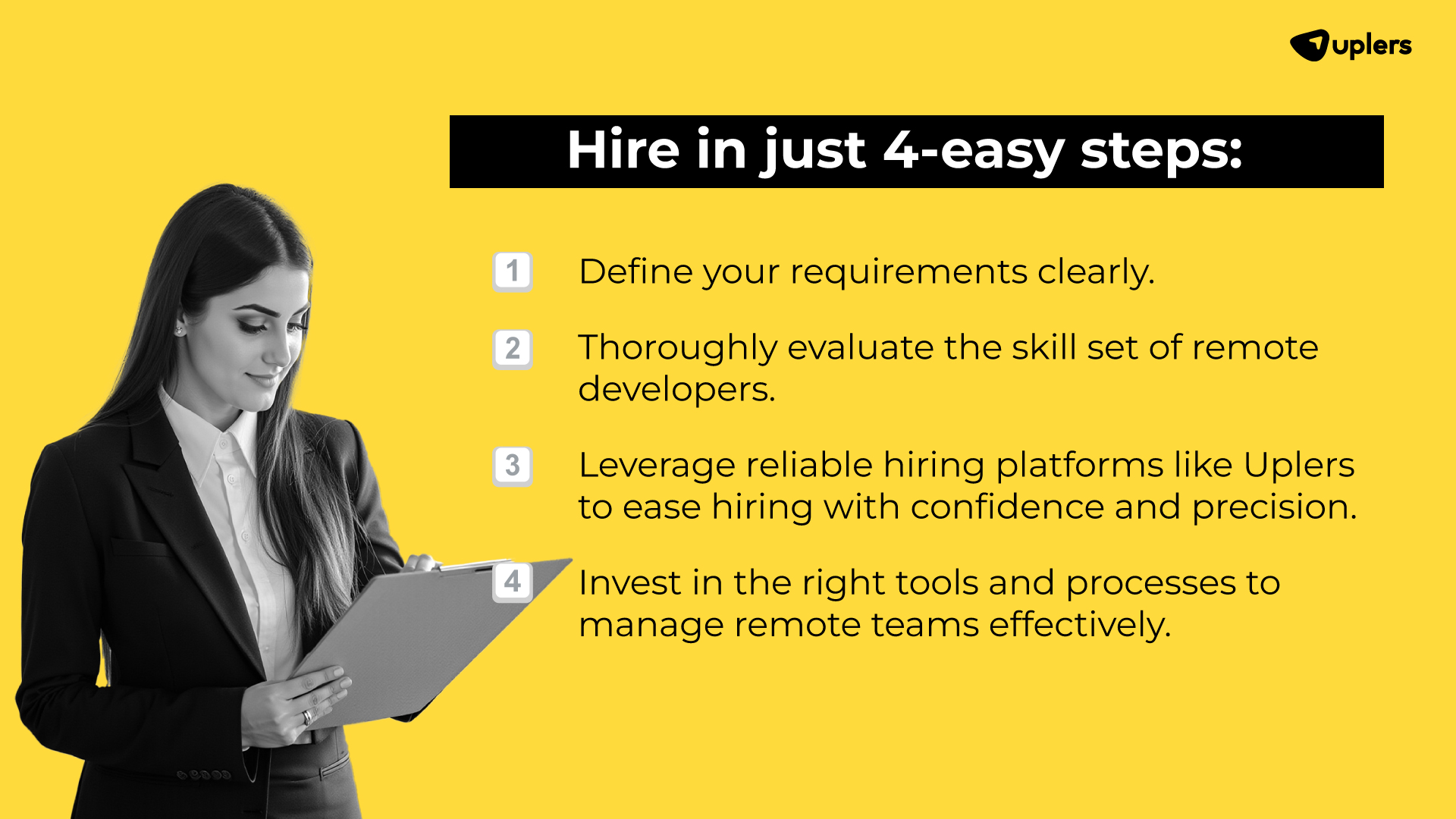
When you hire remote talent from Uplers they stand out of the crowd with their flexibility, global expertise, and availability at a more affordable rate. For instance, if you hire an Android developer from the USA, the average annual salary starts from $111,800. Whereas, you can hire an Android developer from India for an annual salary starting as low as $21600.
Why go through all the hiring hassle alone when we are here to share and mitigate the burden? Why worry about how to hire remote developers when we offer a lifetime free talent replacement guarantee.
Ready to Hire Remote Developers?
Hiring a dedicated remote development team can prove to be a transformative experience for your SaaS business if you do it the right way. With careful planning and execution nothing is challenging. Here’s a recap of some final hiring tips that can help you build a high-performing remote team:
- Define your requirements clearly.
- Thoroughly evaluate the skill set of remote developers.
- Leverage reliable hiring platforms like Uplers to ease hiring with confidence and precision.
- Invest in the right tools and processes to manage remote teams effectively.
If you still have doubts on how to hire remote developers, reach out to us to further streamline your hunt for the right talent.


